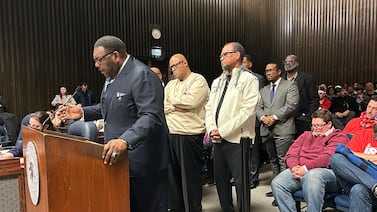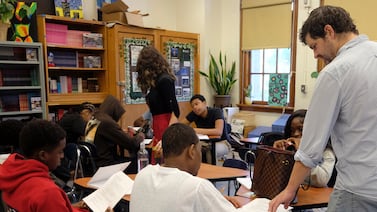Sign up for Chalkbeat Newark’s free newsletter to keep up with the city’s public school system.
Tricia Alcaraz is a proud first-grade teacher, but her journey into the classroom came with long nights of studying, financial worries, tests – and support from a Newark nonprofit.
A single mother from Trinidad, Alcaraz always wanted to work with children. After trying pediatric nursing and running her own daycare, she spent 15 years working in New York City schools. She started as a paraprofessional and worked her way up to a teaching role while taking college classes, but she was never a fully certified teacher. In 2021, she bought her first home and moved across the Hudson River.
With a mortgage on her mind and bills mounting, Alcaraz spent six months applying to teaching jobs in New Jersey as she navigated the certification process. With years of classroom experience and a master’s degree in early childhood education, Alcaraz was offered a two-year teacher associate contract by Great Oaks Legacy Charter School in Newark, and needed to earn her credentials in the state during that time.
A Newark nonprofit called Gateway U helped her get across the finish line.
“I absolutely needed it,” said Alcaraz about the nonprofit, which offers college-degree programs and an accelerated teacher pathway program that helps aspiring teachers by providing wraparound services and study materials as they prepare for their required exams. “I was going through some financial stuff and other issues but they took personal interest in me to make sure that everything was going good.”
As school districts across New Jersey struggle to fill teaching positions and retain staff, observers say programs like those at Gateway U could help potential educators who face financial struggles or other barriers land certified teaching roles.
“As a former school leader, I think about the talent I would have had to pass up,” said Saymah Nah, Gateway U executive director. “Lots of people in our community have a knack for teaching but some don’t have the resources to make a career out of it. The biggest reason being their finances.”
During the 2020-21 school year, New Jersey reported teacher shortages in math, science, world languages, special education, vocational training, and English as a second language. Newark faces shortages of bilingual and special education teachers.
Newark Public Schools started this school year with 77 teaching vacancies and 400 new teachers, according to district spokesperson Nancy Deering.
Great Oaks Legacy Charter School, where Alcaraz is a first grade teacher, has 166 teaching positions and they’ve hired a total of 84 new teachers for this school year. Five other Great Oak staff members participated in Gateway U’s program, “a partner in finding talent and supporting people’s passions for teaching,” said Jared Taillefer, executive director at the charter network.
Alcaraz joined the summer pilot of the teacher pathway program where she joined 15 other students in a six-week intensive “bootcamp” to prepare for certification exams and get help completing the rest of her requirements.
The accelerated pathway program is designed for people like Alcaraz, local degree-holding school staff looking to become eligible for full-time teaching positions in the state.
“With the right partners, the right model, and support, we can come together to really make change and develop sustainable solutions to the teacher shortage,” Nah said.
“Everything I could cut out was beneficial”
Gateway U’s teacher program includes two pathways: one for students who have college degrees and one for school staff who need academic support to earn bachelor’s degrees.
In order to become a teacher in the Garden State, future educators must earn a bachelor’s degree, complete a teacher preparation program, pass certification exams, and complete student-teaching requirements.
Alcaraz started her second year of teaching in New Jersey this school year and since her New York teaching certification did not transfer over, she wasn’t sure what requirements she needed to fulfill.
One of the ways Gateway U recruits candidates is through school leaders who nominate “exceptional individuals who need to be in front of kids,” said Kwame Floyd, a consultant and senior advisor for Gateway U.
Alcaraz was referred to the teacher pathway program by her school’s principal, and then screened to ensure she met the requirements, including at least two years of school-based experience, a college degree, and a 3.0 grade point average.
After being accepted into the accelerated program, Alcaraz learned what she needed to complete her teaching requirements and received personalized support as she prepared for her certification exams in English, reading, and math. The program also covered her test fees.
Alcaraz completed her student teaching requirements over the summer and said Gateway U’s program gave her the flexibility to fit everything into her schedule. She also received food assistance and program staff checked in on her every week.
“There are so many exams I didn’t know about and I wasn’t aware of what I needed to take,” Alcaraz added. “I’m a single mom, so everything I could cut out was beneficial.”
Diversifying the teacher workforce
Of the 16 students in this year’s summer pilot program, 95% identified as individuals of color. Gateway U targets recruitment to both diversify the teaching force in Newark and support minorities in getting college degrees.
Studies have shown that a diverse teaching workforce allows students to connect with educators from different backgrounds and gives teachers a chance to work and learn from each other.
A Newark native, Nah said the teacher pathway program is a way to help future educators get into the classrooms quicker and without thousands of dollars in debt.
Many Gateway U candidates come from low-income backgrounds or are the first in their families to go to college. Alcaraz was among the first in her family to go to college and buy a home.
Some Gateway U participants need help accessing an affordable college-degree program, housing assistance, childcare, and other services outside of their career goals, Nah said. Gateway U also offers students an opportunity to earn a degree for no more than $7,000 per year, through a partnership with Southern New Hampshire University, a private, accredited non-profit college.
“There are so many organizations out there but people don’t really know about them,” Nah added. “This is about breaking down silos and bringing everything together so people can navigate life easier.”
In January, Gateway U will welcome its second cohort to the accelerated program where over the course of 12 weeks, participants will meet in person at its student center in downtown Newark and virtually to work on preparing for their teaching requirements. Interested applicants must apply by October 20.
Alcaraz is grateful for the program’s support as she moved her life to New Jersey. Her ultimate goal is to obtain a degree in special education — something she hopes to pursue once her finances get better.
“I just love kids. I feel like this is the time, the most delicate time in their life and they need caring, nurturing people who are genuinely interested in their education,” Alcaraz added.
Clarification: Sept. 29, 2023: The story was clarified to show that the Gateway U program offers wraparound services and study materials to help local school staff and future educators in their pursuit of becoming a licensed teacher in New Jersey. Gateway U alone will not lead to educator certification.
Jessie Gomez is a reporter for Chalkbeat Newark, covering public education in the city. Contact Jessie at jgomez@chalkbeat.org.





